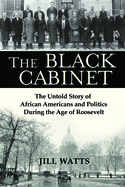
In 1933, as FDR's first New Deal programs sprung up across a United States in crisis, NAACP official William Pickens found the Roosevelt administration's relief efforts lacking: he saw Roosevelt's NRA--the National Recovery Act--as more akin to a "Negro Removal Act," thanks to the early New Deal's targeting of aid toward white communities and its enshrinement of discriminatory hiring practices.
This vivid, penetrating study by historian Jill Watts (Hattie McDaniel: Black Ambition, White Hollywood; Mae West: An Icon in Black and White) captures how determined black intellectuals and activists accumulated the power to document the inequalities of the New Deal, often from within its own agencies, and to nudge a reluctant federal government toward seeking relief for all Americans. Chief among this unofficial cabinet's accomplishments: pressuring Roosevelt into signing an executive order that barred racist hiring practices in the defense industry, a pioneering antidiscrimination regulation that, decades later, would stand as the foundation of affirmative action law.
Despite such triumphs, the Black Cabinet faced much frustration, disappointment and intractable racism. Roosevelt himself never officially acknowledged its existence, even as its members were touted in black newspapers and integrated government lunchrooms. Watts's attention to personalities and the nuts-and-bolts practicality of D.C. decision-making builds the story's tension. She's adept at capturing complex lives in a page or two, and her treatment brings vigorous life to figures like Mary McLeod Bethune, the activist turned official, and Lucia Mae Pitts, a secretary skeptical at first of her white boss's dedication to black America. --Alan Scherstuhl, freelance writer and editor

